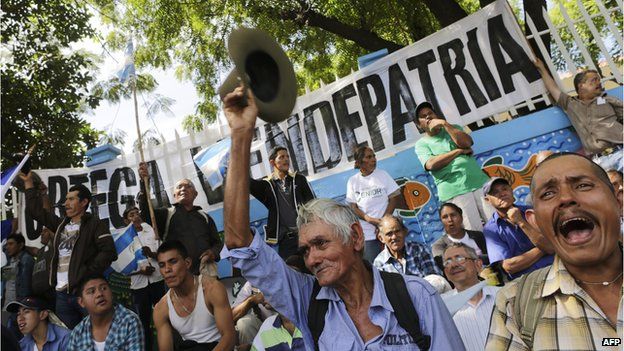Nicaragua canal scheme 'must be dropped'
- Published

Nicaragua must scrap a deal to build a massive inter-oceanic canal as it tramples on the environment and human rights, a leading rights body says.
Up to 120,000 peasants had no way of relocating and there was insufficient compensation, the International Federation for Human Rights said.
The $50bn (£32bn) scheme, started in December 2014, is being built by a Chinese firm.
Nicaragua's government says the canal will bring vital investment.
Dimitris Christopoulos, president of the International Federation for Human Rights (FIDH), said: "Respecting nature and the rights of rural communities is not a luxury. It's a duty.
"These projects will have a dramatic impact on the environment and on human rights. It is unimaginable to sell off territory as such. The government must back out."
Lake concerns
Nicaragua's government has granted the HKND consortium, led by investor Wang Jing, the concession to build the canal and operate it for 116 years.
In a new report, the FIDH says under the deal "constitutional and legal guarantees provided for by the Nicaraguan law are not respected".
"The expropriations process doesn't provide for any administrative or judicial recourse, but does provide for a blatantly insufficient compensation," it says.
The report expresses particular concerns for Cocibolca Lake, which it says is the "main fresh water reserve for all of Central America".
It cites "hydrocarbon pollution, salinity and turbidity problems," adding: "No element related to sustainable development has been included in the project."
It said all of the 131 people it interviewed in affected areas had complained of state intimidation.
Nicaraguan authorities have not commented on the report.
When the scheme was unveiled in July 2014, the government said it had chosen the route so it would avoid areas of great biodiversity, indigenous territories and environmentally protected lands.
The government estimated then that the scheme would lift more than 400,000 people out of general poverty by 2018 with the help of revenues created by the project. It was given a five-year completion date.
Officials say the canal is essential to allow for increased global trade and ever larger tankers, many of which are too large for the Panama Canal, even after its current expansion.
- Published18 March 2015
- Published8 July 2014